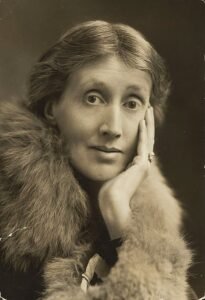Books By Virginia Woolf
- The Voyage Out (1915) – standalone
- Night and Day (1919) – standalone
- Jacob’s Room (1922) – standalone
- Mrs. Dalloway (1925) – standalone
- To the Lighthouse (1927) – standalone
- Orlando: A Biography (1928) – standalone
- The Waves (1931) – standalone
- Flush: A Biography (1933) – standalone
- The Years (1937) – standalone
- Between the Acts (1941) – standalone
About Virginia Woolf
 Virginia Woolf, born Adeline Virginia Stephen on January 25, 1882, in London, England, was a pioneering modernist writer, essayist, and literary critic. Renowned for her innovative narrative techniques and exploration of consciousness, Woolf made significant contributions to 20th-century literature, challenging traditional literary conventions and reshaping the boundaries of fiction.
Virginia Woolf, born Adeline Virginia Stephen on January 25, 1882, in London, England, was a pioneering modernist writer, essayist, and literary critic. Renowned for her innovative narrative techniques and exploration of consciousness, Woolf made significant contributions to 20th-century literature, challenging traditional literary conventions and reshaping the boundaries of fiction.
Woolf’s upbringing in an intellectually stimulating environment, surrounded by prominent literary figures of the time, greatly influenced her literary pursuits. She began her writing career as a contributor to literary journals and later emerged as a central figure in the Bloomsbury Group, a circle of influential writers, artists, and intellectuals.
Throughout her career, Woolf produced a diverse body of work, including novels, essays, short stories, and literary criticism. Her early novels, such as “The Voyage Out” (1915) and “Night and Day” (1919), demonstrated her keen observational skills and keen interest in the complexities of human relationships.
However, it was with her groundbreaking novels of the 1920s and 1930s that Woolf established herself as one of the foremost modernist writers. Works such as “Mrs. Dalloway” (1925), “To the Lighthouse” (1927), and “Orlando: A Biography” (1928) exemplified her experimental narrative techniques, stream-of-consciousness writing, and exploration of themes such as time, memory, and gender.
Woolf’s literary achievements extended beyond her fiction writing. She was also a prolific essayist and literary critic, known for her incisive analyses of literature and her advocacy for women’s rights and social equality. Her collection of essays, “A Room of One’s Own” (1929), remains a seminal feminist text, exploring the relationship between gender, creativity, and economic independence.
Despite struggling with mental health issues throughout her life, Woolf continued to write and publish prolifically until her tragic death by suicide in 1941. Her legacy as a trailblazing writer and thinker endures, with her works celebrated for their profound insight, lyrical prose, and enduring relevance to contemporary society. Virginia Woolf remains an icon of modern literature, revered for her fearless exploration of the human psyche and her enduring influence on generations of writers and readers alike.

